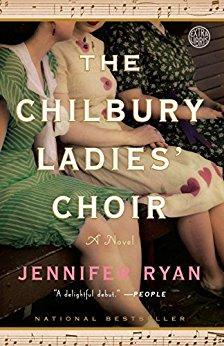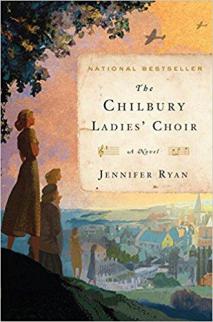
The Chilbury Ladies’ Choir
By Jennifer Ryan
418 pages, ebook, hardcover, paperback, audiobook, audio CD
Broadway Books, Random House, LLC,
February 2017
Historical fiction, Women’s lit
⭐⭐⭐⭐
This book also has a second cover, which is absolutely lovely.
This book is written in the form called epistolary. Written with notices, letters, journal entries and notes by the women of the ladies’ choir.
Epistolary novel – Wikipedia https://en.wikipedia.org/wiki/Epistolary_novelAn epistolary novel is a novel written as a series of documents. The usual form is letters, although diary entries, newspaper clippings and other documents are sometimes used. Recently, electronic “documents” such as recordings and radio, blogs, and e-mails have also come into use.
Using this format created an interesting insight into the story. It allowed the author to move the story along simply by changing to another journal or letter. Let the next person tell the story from their viewpoint, reveal their secrets, see things from their side of the village square.
I was sold on the beautiful cover that I saw originally advertised, the one on the hardcover version of the book. I thought it was so lovely with the women standing on the hills over their village and watching the planes. The colors were so soft and yet they glowed. I wish that had been on the Kindle edition that I purchased. The substitute cover is not anywhere near as nice.
The book is about the women in a village called Chilbury who form a women’s-only choir. They are almost scandalized at their own termidity, women-only. No men? Surely you can’t have a choir without men. But they do, and they do it very well. Prim, their new choir mistress, shows them the way. She shows them how to sing from their hearts and how it makes their music better. So much better that they win a contest. Prim is killed in the bombing and Mrs. Tilling takes the position as choir mistress. Mrs. Tilling really starts to change from that point. She finds her strength and her courage and she does what needs doing. Mrs. Tilling was a very interesting character. She starts out as a mother who is just trying to hold out until her son comes home from the war. She wants nothing to do with anyone from outside the village. She’s not even particularly friendly to those in the village. She’s a nurse by training, and has taken the midwife training so that she can help Hattie when it comes time for her to have her child. She’s worried about the other midwife in the village, Miss Paltry. As it happens, Mrs. Tilling is out of town the day the two babies due are born. And Miss Paltry takes advantage completely. Mrs. Tilling eventually figures out what has been done and makes Miss Paltry aware of the fact that she knows what’s happened. She also makes her confess. So she knows Miss Paltry’s secret. By extension, she knows the Brigadier’s secret, too. She collects secrets simply by being on hand when things happen. Nursing a fatally wounded soldier, she has an errand to do for him after he dies. She has to take a ring to “Carrington”. Carrington turns out to be another injured soldier on leave who was his homosexual lover. This is illegal in this time. But Mrs. Tilling doesn’t judge these two men. She delivers the ring and the message of love and keeps their secret. She even stands up to the young man’s father when he tries to interfere, Viscount Carrington. This earns her young Carrington’s respect and friendship, which she later needs to help with another matter. She initially doesn’t want anything to do with her lodger. She resents him because he is staying in her son’s room. Finally, she realizes that he is just a human being doing his job for the war and she starts treating him much better. She makes his meals and talks with him. They share the basement bunker much more congenially. They discuss his children, three little girls. She discovers he’s a widower. In the end, she marries him and moves to London with him. She loves him. She has come to accept that her son is a grown man now and will come home whether she is there or not, if that is his fate. The Colonel’s job is in London and there are plenty of hospitals in London where she can do a lot of good.
Venetia Winthrop is a young femme fatale. Taking every man around just because she can, not because she wants them. She even takes the man her sister, Kitty, desperately wants and believes will marry her. Venetia finally has to really work to get one particular man to give in. Alistair is mysterious. He’s an artist, but he’s much more. He’s into the black market and other things. She’s seen him speaking with a man in poor-fitting clothes speaking German and handing over a passport and papers. Then he disappears during the bombing. Venetia fears he’s dead. She also discovers she’s pregnant with his child. The word gets out and causes all sorts of trouble. A fight with Henry gets physical and puts an end to her pregnancy and their very brief engagement. Henry’s fighting with everyone and puts an end to Kitty’s allusions about marriage as well. It’s the loss of her child that helps Venetia finally to grow up and focus on being a decent person. Then when she sees Alistair in the audience at the concert, she knows she still loves him and only him.
These were the two women that I liked the best in the book. But much more happened. People died in the bombing. Babies got swapped. People got paid off. Money got stolen. People got taken advantage of. Bullies got straightened out. Women found their strength in joining together and singing. In supporting each other.
The author provided questions for discussion at the end. One of them was “What impact did the war have on women, work, and society? How do you think women’s equality has progressed since the Second World War? War made women stronger because they had to do the work men had been doing just to keep things running at home while the men were off at war. They worked the farms completely, even the hard, physical jobs the men used to do. They worked the factories the men used to work. It wasn’t easy at first, women had to build up the muscle to do some of these jobs and the stamina to keep going, but they managed to do it. The country didn’t stop because the men were gone. When the men came back, the women were in their jobs and some didn’t want to give up the well-paying jobs. It caused problems. The women lost their positions and the men were given their jobs back for the most part. But women had had a taste of running things and they knew they were strong and capable. They’d come out of the box and they really didn’t fit back in the box anymore. Men and women still aren’t equal in the workplace today. In the military, there are still more men than women. In combat, women are limited in what they can do. In regular workplaces, men are paid better than women for the same positions. There is still not equality, but not for lack of effort on the part of the women.
Physically, the average man and woman are not equal. Physically, the average man is more capable of heavier labor than the average woman. So, each should be paid according to their abilities. When it comes to brain power, gender has nothing to do with ability, so it should have nothing to do with recompense either. When that happens, we will have equality.
Highly Recommended
Advertisements Share this:- More





